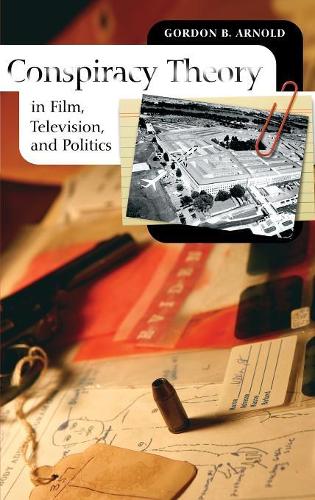
Conspiracy Theory in Film, Television, and Politics
(Hardback)
Publishing Details
Conspiracy Theory in Film, Television, and Politics
By (Author) Gordon B. Arnold
Bloomsbury Publishing PLC
Praeger Publishers Inc
30th September 2008
United States
Classifications
General
Non Fiction
001.9
Physical Properties
Hardback
200
Width 156mm, Height 235mm
454g
Description
Since the assassination of John F. Kennedy, motion pictures and television productions-some based on historical fact and conjecture, others clearly fanciful-have embraced the idea that conspiracies shape many events, hide others, and generally dictate much of the course of modern life, often to the disadvantage of the average person. As a result, conspiracy theories have developed into a potent undercurrent in American politics. By the 1990s, it was not unusual to find conspiracies used as explanations for a wide range of political events that would otherwise seem to have quite ordinary explanations. Thus, a vast right-wing conspiracy was suggested as the source of Bill Clinton's troubles, just as conspiracy-like machinations of the liberal media were used to explain why the picture of world events did not coincide with conservative views. And this is to say nothing of the bitter arguments that still erupt over varying explanations for the attacks of 9/11. Regardless of a person's opinion about such claims, what these and many other examples clearly show is that conspiracy-theory explanations have penetrated mainstream American thought. Here, author Gordon Arnold examines the evolution of this cultural climate in the United States. Conspiracy Theory in Film, Television, and Politics examines the intersection of various film and television productions in the context of unfolding political developments. The chapters follow this story chronologically, showing how screen media have both reflected and shaped the cultural milieu in which traumatic events and political controversies have been interpreted with increasing cynicism. The work also reviews the original contexts in which film, television, and political manifestations of conspiracy ideas first appeared.
Reviews
Conspiracy Theory in Film, Television and Politics provides a strong historical overview of conspiracy theory offering examples and explanations of how conspiracy theory explanations have penetrated mainstream American thought. From the evolution of social and political events nurturing popular ideas of various conspiracy theories to how conspiracies were interpreted in film, TV and politics, this is an excellent in-depth survey suitable for any college-level library strong in social issues. * The Midwest Book Review *
Arnold targets less-experienced readers interested in the phenomenon of conspiracyor, more precisely, conspiracy theoryas approached from the angle of the liberal arts. He places seeming conspiracies in the context of the histories of the social and political cultures that harbor them or invoke them as explanations of otherwise inexplicable events. Thus, the book is neither political nor mass media history, but rather a synthesis of how a society under stress that often has its origins in an external source (e.g., Soviet expansionism during the Cold War) explains an apparent loss of military superiority Recommended. Lower-division undergraduates and general readers. * Choice *
Author Bio
GORDON B. ARNOLD is Professor of Liberal Arts at Montserrat College of Art in Beverly, Massachusetts, where he has taught courses in film, media, and politics for many years. He was previously a reference librarian and library director at public and academic libraries. His publications include the book The Politics of Faculty Unionization (2000), as well as articles in Library Journal, Change, and Labor Studies Journal.
